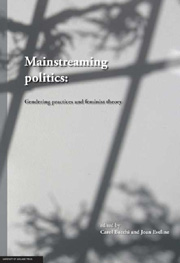Book contents
- Frontmatter
- Contents
- Preface
- Personal reflection
- Publisher's note
- List of authors and project personnel
- Acknowledgements
- Introduction
- 1 Gender/ing impact assessment: Can it be made to work?
- 2 Mainstreaming and neoliberalism: A contested relationship
- 3 Gender analysis and social change: Testing the water
- 4 What are we mainstreaming when we mainstream gender?
- 5 Approaches to gender mainstreaming: What's the problem represented to be?
- 6 Power, resistance and reflexive practice
- 7 Gender mainstreaming: The answer to the gender pay gap?
- 8 Gender analysis and community participation: The role of women's policy units
- 9 The invisibility of gendered power relations in domestic violence policy
- 10 Gender mainstreaming versus diversity mainstreaming: Methodology as emancipatory politics
- 11 University-public sector research collaboration: Mine the space, never mind the gap
- 12 Obeying organisational ‘rules of relevance’: Gender analysis of policy
- 13 Gender mainstreaming or diversity mainstreaming? The politics of ‘doing’
- Conclusion A politics of movement
- Author Index
- General Index
12 - Obeying organisational ‘rules of relevance’: Gender analysis of policy
Published online by Cambridge University Press: 05 June 2012
- Frontmatter
- Contents
- Preface
- Personal reflection
- Publisher's note
- List of authors and project personnel
- Acknowledgements
- Introduction
- 1 Gender/ing impact assessment: Can it be made to work?
- 2 Mainstreaming and neoliberalism: A contested relationship
- 3 Gender analysis and social change: Testing the water
- 4 What are we mainstreaming when we mainstream gender?
- 5 Approaches to gender mainstreaming: What's the problem represented to be?
- 6 Power, resistance and reflexive practice
- 7 Gender mainstreaming: The answer to the gender pay gap?
- 8 Gender analysis and community participation: The role of women's policy units
- 9 The invisibility of gendered power relations in domestic violence policy
- 10 Gender mainstreaming versus diversity mainstreaming: Methodology as emancipatory politics
- 11 University-public sector research collaboration: Mine the space, never mind the gap
- 12 Obeying organisational ‘rules of relevance’: Gender analysis of policy
- 13 Gender mainstreaming or diversity mainstreaming? The politics of ‘doing’
- Conclusion A politics of movement
- Author Index
- General Index
Summary
Introduction: Joan Eveline and Carol Bacchi
There is considerable research showing that organisations, including government agencies and the policies they produce, consider gender irrelevant to their core business. The gender mainstreaming of policy is designed to challenge such an assumption, using the argument that mainstreaming gender can ‘transform’ the ubiquity of genderblind policies. Various countries, as this book (among others) shows, have developed particular methods and tool kits for transforming the outcomes of their policies, in order that those policies take seriously the relevance of gender.
This chapter underscores the question of gender (ir)relevance, and how it is produced by complex organisational practices. It turns to feminist organisational theory to analyse the institutionalised practices that construct and organise policy priorities (see Chapter 6). In agreement with Benschop and Verloo (2006), we argue that effective gender mainstreaming cannot be achieved without attention to the specific organisational sites in which policy is developed and implemented. The chapter draws on the ‘turn to practice’ in organisational studies, and feminist strategies of ‘sudden seeing’, to consider what our insights from the gender analysis study might offer future interventionist projects.
Western Australia furnishes most of the examples used in the chapter, although general descriptions of the project's aims and challenges apply also to South Australia. The starting point for the chapter is our finding in Western Australia that it was only through doing the gender analysis in their organisational contexts that policy actors came to see the relevance of gender to policy.
- Type
- Chapter
- Information
- Mainstreaming PoliticsGendering Practices and Feminist Theory, pp. 283 - 310Publisher: The University of Adelaide PressPrint publication year: 2010



